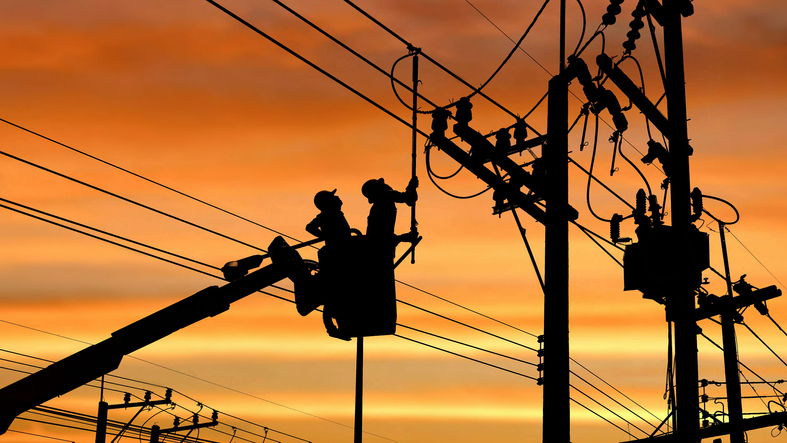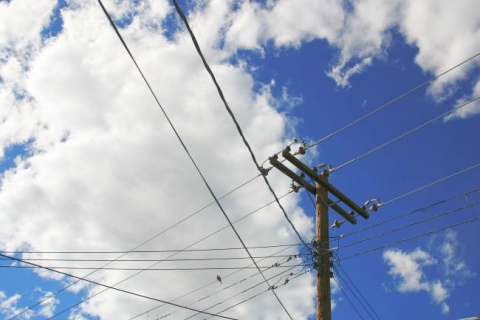- Home
- Outage Center
- Electric Safety
Safety Basics
In theory, electricity looks for the quickest path to ground. On its journey to the ground, electricity travels through conductors. Good conductors include water, metals, and people. Human beings are good conductors simply because about 70% of the body is composed of water.
When electricity travels through the body, it can overload the nervous and cardiovascular systems. Electric burns can cause serious injury or death. Simply, electrical safety is something we should not take for granted.
In the event that a power line or utility pole falls on your vehicle while you are inside, it is important to stay where you are rather than try to exit. Inside the vehicle is safe because you are not part of the electricity’s path to the ground. Leaving the car puts you at risk for potentially fatal electrocution. Call 911 and wait for the local electric utility to de-energize the lines. Warn others who may try to help you to stay far away and call for emergency responders if you do not have access to a cell phone.
The instances of fire forcing the occupant to leave a vehicle are rare, but only then should you consider exiting. The best way to do so is to jump out without touching the vehicle or ground at the same time and land with both feet together. Then shuffle away while keeping your feet together and on the ground constantly.

Safety in the Home
Outlets
Cover unused outlets with caps or tape and never probe an outlet with conductive objects.
Cords & Wires
- Replace worn, frayed or damaged power cords.
- Don't hide wires under carpets or along heating baseboards.
Appliances
- Keep all electrical appliances, such as hair dryers, blenders, can-openers, radios, televisions, away from water.
- To avoid overloads, limit the number of appliances plugged into one outlet.
Circuit Breakers
Make sure that circuit breakers and fuses are properly identified.
Water & Electric
Wherever electricity, water and the human body come together, use GROUND-FAULT CIRCUIT INTERRUPTERS (GFCI). These electrical protection devices sense a "short" or "fault" and disconnect the circuit. Unlike fuses and circuit breakers that depend on heavy overloads or shorts to function, GFCIs sense even small faults and disconnect the circuit before anyone is injured.

Safety Tips for Kids
- Never fly kites or model planes near power lines.
- Tell children to stay away from utility substations and pad-mounted transformers ("green-boxes") and other electrical equipment.
Safety on the Farm
While electricity is one of the safest forms of energy, farm owners must take the responsibility for recognizing unsafe wiring and other hazardous conditions. If you have a detached shop, storage shed, or a barn for horses and livestock, specific wiring materials and methods as defined by the National Electric Code must be used, especially where dusty or moist conditions exist.
Typical farm hazards include improper grounding, residential-type fixtures that are not designed for use in barns, and undersized heat lamp circuits.
Other electrical safety tips for farm owners:
- Use Ground Fault Circuit Interrupters (GFCI) when utilizing a power tool.
- When utilizing equipment with an auger, boom, or lift be aware of overhead electric lines that could energize the apparatus. Current law requires that you must remain a minimum of 10 feet away from an overhead power line. Also, designate a person whose only responsibility is to direct you away from power lines.
- When digging on your property, be sure to call MISS UTILITY at 1-800-282-8555. MISS UTILITY is the organization which identifies any underground utilities such as electric, gas, water and telephone.
- Be sure that electric fences are properly wired.
Safety Outdoors
Wherever electricity, water and the human body come together, use GROUND-FAULT CIRCUIT INTERRUPTERS (GFCI). These electrical protection devices sense a "short" or "fault" and disconnect the circuit. Unlike fuses and circuit breakers that depend on heavy overloads or shorts to function, GFCIs sense even small faults and disconnect the circuit before anyone is injured.
This is particularly important for outdoor electric use in operating power tools, lawn trimmers, hedge clippers, power spray washers and all electric use around swimming pools.

Also, use power tools that have a three-pronged plug or are marked as double-insulated.
- Never place a ladder where it can fall into a power line or the service line extending to your home. If possible, use a ladder made from non-conductive material such as fiberglass or wood.
- When digging on your property, be sure to call MISS UTILITY at 1-800-282-8555 or dial 811. MISS UTILITY notifies companies and cooperatives when they need to identify any underground utilities such as electric, gas, water and telephone.
- If utilizing any equipment with a boom or lift, be aware of overhead electric lines that could energize the apparatus. Current law requires that you must remain a minimum of 10 feet away from an overhead power line.
- When installing or removing an antenna, survey the surroundings for electric lines or any other type of electrical equipment.

Pole Safety
Delaware Electric Co-op strives to keep poles as safe as possible, but some aspects of maintaining unscathed poles are out of the Co-op's control. Attaching signs, posters and recreational equipment such as basketball rims, can create serious hazards for line personnel.
Fixtures, other than DEC equipment or another utility's joint-use attachment, should not be affixed to the Cooperative's poles.
Sharp objects like nails, tacks, staples, and barbed wire all present eminent dangers for DEC crews, who climb poles all hours of the day and night and in the worst of conditions. If a lineman's hooks cut out while he is climbing, his descent down could become much more severe if an arm or leg catches into a nail or other object tacked onto the pole. Additionally, a lineman's hooks can cut out due to contact with a foreign object on the pole. Also, when linemen have to remove objects from poles in order to climb during an outage, this makes power restoration take that much longer.